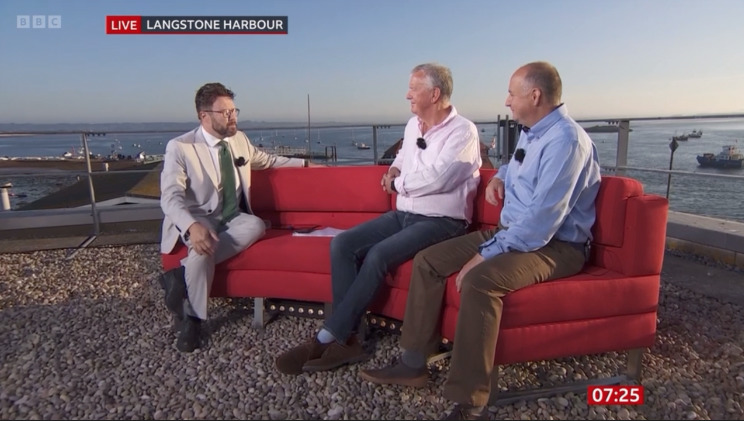Clean Harbours Partnership and Project Spotlight

Published 21:34 on 13 Sep 2023
ESC - under the direction of Bianca Carr and Rob Bailey - was an early sponsor of Project Spotlight a scientific study into "What's in our harbour waters?" The research was initiated by the Clean Harbours Partnership (CHP) in conjunction with the Universities of Portsmouth and Brunel and is informing the high-profile national debate on the country's polluted waters.
Last week CHP played a central role in organising a rare BBC outside broadcast from the University's rooftop at Eastney and also provided key information in the BBC's exposé of potentially illegal sewage dumping. Coverage included news items throughout the day, discussion on BBC Radio 2, 4 & 5 and interviews on Radio Solent and Radio Sussex.
Special guests Feargal Sharkey and local author Kate Mosse joined the discussion 'on the red sofa', and Thérèse Coffey, Secretary of State for Environment, came in via a video link.
Watch the key coverage.
Recently the Club hosted a results presentation by the founders of CHP (ESC members Bianca Carr & Rob Bailey), as well as lead scientists Professor Alex Ford (Portsmouth) and Dr Tom Miller (Brunel). It was a full house made up of other sponsors, citizen scientists and supporters.
Locals had taken 300 water samples and collected 5 species for analysis by the scientists. Some 50 chemicals were identified in both the biota and water samples. Over 30 pharmaceuticals were found including pain killers and drugs for inflammation, Alzheimer's disease and urine infections. In addition, recreational drugs including cocaine and ecstasy were identified, as well as a range of pesticides.
Prof Ford and Dr Miller explained that humans only digest part of what is consumed and outlined that analysis registered some 1200 positive readings, with the highest concentrations found in Langstone seaweed and ragworms. Quantities were generally low in baseline findings, probably owing to last year's drought, but samples taken immediately after heavy rainfall showed level increases of up to 1,000x.
The evening concluded with ideas and comments from the audience, which included:
- - Further testing for a larger range of chemicals (road run off)
- - More analysis to prove the impact of certain substances
- - Ensuring that Southern Water make the investments promised
- - Pressurising the Environment Agency to bring Southern Water to task.
Overall there are very promising signs that people power is starting to 'turn the tide' on pollution but the pressure must continue if improvement is to become a reality. On the plus side, the Environment Agency has started its largest legal case against the water companies, recent local election results showed the importance of water quality, and the issue is set to continue in the run-up to the next General Election.
Rob & Bianca
Image credit: University of Portsmouth/Karen Borncroft

